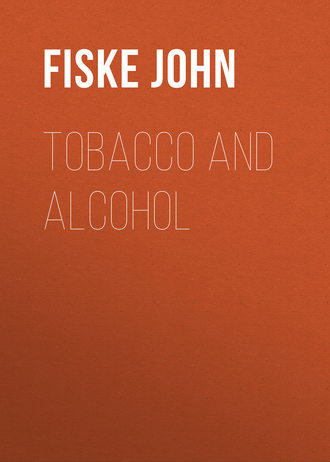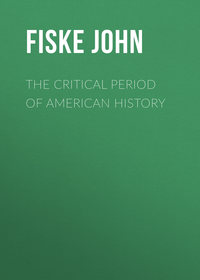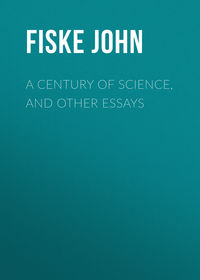 полная версия
полная версияTobacco and Alcohol
For the accuracy of this statement there is to be had the testimony of Dr. Inman, the attendant physician, as well as that "of the lady's husband, of mutual friends occasionally residing in the house with her, of her mother, of her sisters, and of her nurse." We have apparently no alternative but to believe it; and if it is true, it is certainly decisive. It is nothing less than an experimentum crucis. The suggestion that this lady might have kept up her normal activity while nursing children, for a whole year, with no aliment except her own tissues and the water and vegetable matter contained in her ale and brandy, is too absurd to need refutation. The thing is an utter impossibility. Moreover, not being emaciated at the end of the year, she had probably been consuming her own tissues but very little. Her weight, her muscular activity, and the natural heat of her body, could have been sustained by nothing but the alcohol; which thus appears as a true food, at once nourishing, strength-giving, and heat-producing.
This conclusion is further re-enforced by the numerous cases on record of persons who have lived actively for many years upon a diet of alcoholic liquor accompanied by a quantity of solid food notoriously inadequate to support life. The case of Cornaro is outdone by some of those quoted by Dr. Anstie, as having occurred under his own observation. Of twelve cases which are described in detail, the most remarkable is that of a man aged 83, whose diet for twenty years had consisted of one bottle of gin and one small fragment of toasted bread daily. This old fellow, says Dr. Anstie, "would have been of little service as a practical illustration of the bodily harm wrought by drinking, being in truth rather an unusually active and vigorous person for his time of life." Probably the old man was not narcotized by his daily bottle of gin; or he would, long before the twenty years had elapsed, have shown symptoms of nervous disease. In most of these cases of abnormal diet, there occurs after a while a general breaking down of the nerve-centres, shown in delirium tremens, epileptic fits, or a sudden stroke of paralysis. They are not quoted, therefore, as examples to be followed, but as very important items of evidence in favour of the opinion that alcohol is food.
Taking all these considerations together, we believe it to be tolerably well made out that alcohol, whether changed within the body or not, is a true food, which nourishes, warms and strengthens. And Dr. Brinton, in the following passage, declares it to be, in many cases, a necessary food. "That teetotalism is compatible with health, it needs no elaborate facts to establish; but if we take the customary life of those constituting the masses of our inhabitants of towns, we shall find reason to wait before we assume that this result will extend to our population at large. And, in respect to experience, it is singular how few healthy teetotalers are to be met with in our ordinary inhabitants of cities. Glancing back over the many years during which this question has been forced upon the author by his professional duties, he may estimate that he has sedulously examined not less than 50,000 to 70,000 persons, including many thousands in perfect health. Wishing, and even expecting to find it otherwise, he is obliged to confess that he has hitherto met with but very few perfectly healthy middle-aged persons, successfully pursuing any arduous metropolitan calling under teetotal habits. On the other hand, he has known many total abstainers, whose apparently sound constitutions have given way with unusual and frightful rapidity when attacked by a casual sickness." "This," says an English reviewer of the French experiments, "is quite in accordance with what I have myself observed, and with what I can gather from other medical men; and it speaks volumes concerning the way in which we ought to regard alcohol. If, indeed, it be a fact that in a certain high state of civilization men require to take alcohol every day, in some shape or other, under penalty of breaking down prematurely in their work, it is idle to appeal to a set of imperfect chemical or physiological experiments, and to decide, on their evidence, that we ought to call alcohol a medicine or a poison, but not a food. I am obliged to declare that the chemical evidence is as yet insufficient to give any complete explanation of its exact manner of action upon the system; but that the practical facts are as striking as they could well be, and that there can be no mistake about them. And I have thought it proper that, while highly-coloured statements of the results of the new French researches are being somewhat disingenuously placed before the lay public, there should not be a total silence on the part of those members of the profession who do not see themselves called upon to yield to the mere force of agitation."66 If this view of the case, which so strongly recommends itself to the mind of the practical physician, be the true one, we are forced to regard teetotalism, considered not in its moral but in its physiological aspects, as a dietetic heresy nearly akin to vegetarianism. Man can do without wine, as he can do without meat; but the rational course is to adopt that diet from which we can obtain the greatest amount of available vital power.
But even if we were to give up the doctrine that alcohol is a true food, the great indisputed and indisputable fact of its stimulant value would still remain. Tobacco neither nourishes the body nor warms it; yet it enables us to earn our daily bread with less fatigue, and to support the incessant trials of life with a more even spirit. The value of alcohol as a stimulant is inferior only to that of tobacco; or perhaps, for general purposes, it is quite unsurpassed. It compensates for the occasionally inevitable incapacity of ordinary food to maintain due nutrition; and in this way enables us to work longer, and with a lighter heart, and with less fear of ultimate depression. It bridges over the pitfalls which the complicated exigencies of modern life are constantly digging for us. Warm-hearted but weak-headed radicalism may imagine a utopian state of things in which money will grow on bushes and every one mind the moral law, and digestion be always easy, and vexation infrequent, and "artificial" stimulus unnecessary; but this is not the state of things amid which we live. A modern man cannot, if he does his duty, secure to himself the enjoyment of such a state. There are times when he must sacrifice a little of his own round perfection, if it be only to lend a helping hand to his neighbour. A kind of valetudinarian philosophy is now afloat, which says, Look out, above all things, for your own physical welfare. This philosophy contains a truth, but as usually manifested it is nothing but the result of a morbid self-consciousness. Duty sometimes requires that we should cease coddling ourselves, and go to work, unless we would see some cause suffer which interests other men, living and to come, besides ourselves. We must sometimes run to put the fire out, even if we do thereby lose our dinner, and interfere with the stomach's requirements. It is useless, then, to talk about agents which "support us in doing wrong," when, from the very constitution of the world and of society, we can no more go exactly "right" than we can draw a line which shall be mathematically straight. It is useless to speculate about an ideal society in which men can dispense with the agents which economize their nervous strength, when we find as a historical fact that no nation has ever existed which has been able to dispense with those agents. As long as there are inequalities in the daily ratio of waste and repair to be rectified, so long we shall get along better with wine than without it. For this, looked at from the widest possible point of view, is the legitimate function of alcohol, —to diminish the necessary friction of living.
This too is the view of Liebig: "As a restorative, a means of refreshment when the powers of life are exhausted, of giving animation and energy where man has to struggle with days of sorrow, as a means of correction and compensation where misproportion occurs in nutrition, wine is surpassed by no product of nature or of art… In no part of Germany do the apothecaries' establishments bring so low a price as in the rich cities on the Rhine; for there wine is the universal medicine of the healthy as well as the sick. It is considered as milk for the aged."67
This is also the view of Dr. Anstie. Comparing the action of alcohol upon the organism with that of chloroform and sulphuric ether, he observes: "It seems as if the former were intended to be the medicine of those ailments which are engendered of the necessary everyday evils of civilized life, and has therefore been made attractive to the senses, and easily retained in the tissues, and in various ways approving itself to our judgment as a food; while the others, which are more rarely needed for their stimulant properties, and are chiefly valuable for their beneficent temporary poisonous action, by the help of which painful operations are sustained with impunity, are in great measure deprived of these attractions, and of their facilities for entering and remaining in the system."68 Apart from its implied teleology, this passage contains the gist of the whole matter.
As for the Coming Man, whom Mr. Parton appears to regard as a sort of pugilist or Olympic athlete, we suppose he will undoubtedly have to exercise his brain sometimes, he will have to study, think and plan, he will have responsibilities to shoulder, his digestion will not always be preserved at its maximum of efficiency, his powers of endurance will sometimes be tried to the utmost. The period in the future when "we shall have changed all this" is altogether too remote to affect our present conclusion; which is that the Coming Man, so long as he is a member of a complex, civilized society, will continue to use, with profit as well as pleasure, the two universal stimulants, Alcohol and Tobacco.
APPENDIX.
Bibliography of Tobacco
For the benefit of those readers who may feel interested in this subject, the following list is added, of the principal works which have been written on the effects of tobacco. The older ones have, of course, little scientific value, yet they are often interesting and suggestive. They usually made the best use of the science of their time, which is more than can be said of some of the later treatises.
Baumann: Dissertatio de Tabaci virtutibus. Basil, 1579.
Everart: De herba Panacea. Antwerp, 1583.
Ziegler: Taback von dem gar heilsamen Wundkraute Nicotiana. Zurich, 1616.
Marradon: Dialogo del uso del Tabaco. Seville, 1618.
De Castro: Historia de las virtudes y propriedades de Tabacco. Cordova, 1620.
Thorius: Hymnus Tabaci. Leyden, 1622.
Neander: Tabacologia. Leyden, 1622.
Scriverius: Saturnalia, seu de usu et abusu Tabaci. Haarlem, 1628.
Braun: Quæstio medica de fumo Tabaci. Marburg, 1628.
Aguilar: Contra il mal uso del Tabaco. Cordova, 1633.
Frankenius: Dissertatio de virtutibus Nicotianæ. Upsal, 1633.
Ostendorf: Traité de l'usage et de l'abus du Tabac. Paris, 1636.
Venner: Via recta ad vitam longam. London, 1637. (See p. 363, for an entertaining discourse on Tobacco.)
Ferrant: Traité du Tabac en sternutatoire. Bourges, 1645.
Cuffari: I biasimi del Tabacco. Palermo, 1645.
Vitaliani: De abusu Tabaci. Rome, 1650.
Tapp: Oratio de Tabaco. Helmstadt, 1653.
Balde: Satyra contra abusum Tabaci. Munich, 1657.
Magnenus: Exercitationes XIV. de Tabaco. Ticino, 1658.
Rumsey: Organum Salutis. London, 1659.
Paulli: Commentarius de abusu Tabaci Americanorum veteri. Argentorat. 1665.
Baillard: Discours du Tabac. Paris, 1668.
De Prade: Histoire du Tabac. Paris, 1677.
Van Bontekoe: Korte verhandeling van t' menschenleven gezondheit, ziekte en dood, etc. s' Gravenhagen, 1684.
Worp Beintema: Tabacologia, ofle korte verhandelinge over de Toback. s' Gravenhagen, 1690.
Fagon: Dissertatio an ex Tabaci usu frequenti vita brevior. Paris, 1699.
Brunet: Le bon usage du Tabac en poudre. Paris, 1700.
Della Fabra: Dissertatio de animi affectibus, etc. Ferrara, 1702.
Manara: De moderando Tabaci usu in Europæis. Madrid, 1702.
Nicolicchia: Uso ed abuso del Tabacco. Palermo, 1710.
Keyl: Dissertatio num Nicotianæ herbæ usu levis notæ maculam contrahat. Leipsic, 1715.
Cohausen: Pica nasi, seu de Tabaci sternutatorii abusu et noxa. Amsterdam, 1716.
Meier: Tabacomania. Nordhaus, 1720.
– : A Dissertation on the Use and Abuse of Tobacco in Relation to Smoaking, Chewing, and taking of Snuff. London, 1720.
Plaz: De Tabaco sternutatorio. Leipsic, 1727.
Stahl: Dissertatio de Tabaci effectibus salutaribus et nocivis. Erfurt, 1732.
Maloet: Dissertatio an a Tabaco, naribus assumpto, peculiaris quædam cephalalgiæ species, aliique effectus. Paris, 1733.
Alberti: De Tabaci fumum sugente theologo. Halle, 1743.
Garbenfeld: Dissertatio de Tabaci usu et abusu. Argent. 1744.
Beck: De suctione fumi Tabaci. Altdorf, 1745.
Büchner: De genuinis viribus Tabaci. Halle, 1746.
Herment: Dissertatio an post cibum fumus Tabaci, etc. Paris, 1749.
De la Sone: Dissertatio an Tabacum homini sit lentum venenum. Paris, 1751.
Ferrein: Dissertatio an ex Tabaci usu frequenti vitæ summa brevior. Paris, 1753.
Petitmaitre: De usu et abusu Nicotianæ. Basil, 1756.
Triller: Disputatio de Tabaci ptarmici abusu, affectus ventriculi causa. Wittenberg, 1761.
Cuntira: De viribus medicis Nicotianæ ejusque usu et abusu. Vienna, 1777.
Hamilton: De Nicotianæ viribus in Medicina et de ejus malis effectibus in usu communi et domestico. Edinburgh, 1779.
Clarke: A dissertation on the Use and Abuse of Tobacco. London, 1797.
Szerlecki: Monographie über den Tabak. Stuttgart, 1840.
Stahmann: Cigarre, Pfeife, und Dose. Quedlinburg, 1852.
Baldwin: Evils of Tobacco. New York, 1854.
Trall: Tobacco, its History, etc. New York, 1854.
– : Discours contre l'usage du Tabac. Nantes, 1854.
– : Discours en faveur du Tabac. Nantes, 1854.
Tiedemann: Geschichte des Tabaks. Frankfort, 1854.
Vlaanderen: Over den Tabak, bijzonder over zijne on bewerktuigde bestanddeelen. Utrecht, 1854.
Felip: El Tabaco. Madrid, 1854.
Hortmann: Der Tabaksbau. Emmerich, 1855.
Von Bibra: Die Narkotischen Genussmittel und der Mensch. Nürnberg, 1855.
Tognola: Riflessioni intorno all' uso igenico del Tabacco. Padua, 1855.
– : A Commentary on the Influence which the Use of Tobacco exerts on the Human Constitution. Sydney, 1856.
Jarnatowsky: De Nicotiana ejusque abusu. Berlin, 1856.
Asencio: Reflexiones sobre la renta del Tabaco. Madrid, 1856.
Hammond: The Physiological Action of Alcohol and Tobacco upon the Human Organism. American Journal of Medical Sciences. October, 1856.
Budgett: The Tobacco Question, Morally, Socially, and Physically. London, 1857.
Cavendish: A few Words in Defence of Tobacco. London, 1857.
Jeumont: Du Tabac, de son Usage, de ses Effets, etc. Paris, 1857.
Lizars: On the Use and Abuse of Tobacco. London, 1857.
Steinmetz: Tobacco. London, 1857.
Alexandre: Contre l'abus du Tabac. Amiens, 1857.
Fermond: Monographie du Tabac. Paris, 1857.
Koller: Der Tabac. Augsburg, 1858.
Prescott: Tobacco and its Adulterations. London, 1858.
Schmid: Der Tabak als wichtige Culturpflanze. Weimar, 1858.
Demoor: Du Tabac. Brussels, 1858.
Mourgues: Traité de la Culture du Tabac. Paris, 1859.
Morand: Essai sur l'Hygiène du Tabac. Epinal, 1859.
Fairholt: Tobacco, its History and Associations. London, 1859.
Cheever: On Tobacco. Atlantic Monthly, August, 1860.
1
Smoking and Drinking. By James Parton. Boston, Ticknor & Fields, 1868. 12mo, pp. 151.
2
When we first read this remark, we took it for a mere burst of impassioned rhetoric; but on second thoughts, it appears to have a meaning. Another knight-errant in physiology charges tobacco with producing "giddiness, sickness, vomiting, vitiated taste of the mouth, loose bowels, diseased liver, congestion of the brain, apoplexy, palsy, mania, loss of memory, amaurosis, deafness, nervousness, emasculation, and cowardice." Lizars, On Tobacco, p. 29. A goodly array of bugbears, quite aptly illustrating the remark of one of our medical professors, that hygienic reformers, in the length of their lists of imaginary diseases, are excelled only by the itinerant charlatans who vend panaceas. There is, however, no scientific foundation for the statement that tobacco "takes off the edge of virility." The reader who is interested in this question may consult Orfila, Toxicologie, tom. II. p. 527; Annales d'Hygiène, tom. XXXVIII.; and a Memoir by Laycock in the London Medical Gazette, 1846, tom. III.
3
"I am not acquainted with any well-ascertained ill effects resulting from the habitual practice of smoking." – Pereira, Materia Medica, vol. ii., p. 1431. Tobacco "is used in immense quantities over the whole world as an article of luxury, without any bad effect having ever been clearly traced to it." – Christison on Poisons, p. 730. These two short sentences, from such consummate masters of their science as Christison and Pereira, should far more than outweigh all the volumes of ignorant denunciation which have been written by crammers, smatterers, and puritanical reformers, from King James down.
4
Only a basis, however. The argument as applied to tobacco, though a necessary corollary from Dr. Anstie's doctrines, is in no sense Dr. Anstie's argument. We are ourselves solely responsible for it.
5
Sleep is caused by a diminution of blood in the cerebrum; stupor and delirium, as well as insomnia, or nocturnal wakefulness, are probably caused by excess of blood in the cerebrum. We feel sleepy after a heavy meal, because the stomach, intestines and liver appropriate blood which would ordinarily be sent to the brain. But after a drunken debauch, a man sinks in stupor because the brain is partially congested. The blood rushes to the paralyzed part, just as it rushes to an inflamed part; and in the paralysis, as in the inflammation, nutrition and the products of nutrition are lowered. The habitual drunkard lowers the quality of his nervous system, and impairs its sensitiveness, – hence the necessity of increasing the dose. It will be seen, therefore, that it is not the function of a narcotic, as such, to induce sleep, though in a vast number of cases it may induce stupor. The headache felt on awaking from stupor, is the index of impaired nutrition, quite the reverse of the vigor felt on arising from sleep.
6
Mr. Lizars (On Tobacco, p. 54) has the impudence to cite Pereira (vol. ii. p. 1426) as an opponent of smoking, because he calls nicotine a deadly poison! And on p. 58 he similarly misrepresents Johnston. This is the way in which popular writers contrive to marshal an array of scientific authorities on their side. In the case of tobacco, however, it is difficult to find physiologists who will justify the popular clamour. They have a way of taking the opposite view; and when Mr. Lizars cannot get rid of them in any other way, he insinuates that all writings in favour of tobacco "have been got up from more than questionable motives." (p. 137.) This is in the richest vein of what, for want of a better word, we have called radicalism; and may be compared with Mr. Parton's belief that physicians recommend alcoholic drinks because they like to fatten on human suffering! (Smoking and Drinking, p. 56.)
7
Clendon, On the Causes of the Evils of Infant Dentition.
8
Curling, On Tetanus, p. 168; Earle, in Med. Chir. Trans., vol. vi., p. 92; and O'Beirne, in Dublin Hospital Reports, vols. i. and ii.
9
Wood, U. S. Dispensatory.
10
Sigmond, in Lancet, vol. ii., p. 253.
11
Currie, Med. Rep., vol. i., p. 163.
12
Indeed, there are many fatal cases in which tubercles never appear. See Niemeyer on Pulmonary Phthïsis.
13
Stimulants and Narcotics, p. 144.
14
Stimulants and Narcotics, p. 148.
15
Id. p. 224.
16
"The origin of the belief that stimulation is necessarily followed by a depressive recoil is obviously to be found in the old vitalistic ideas. It is our old acquaintance, the Archæus, whose exhaustion, after his violent efforts in resentment of the goadings which he has endured, is represented in modern phraseology by the term 'depressive reaction.' This idea once being firmly established in the medical mind, the change from professed vitalism to dynamical explanations of physiology has not materially shaken its hold." Id. p. 146. An interesting example of the way in which quite obsolete and forgotten theories will continue clandestinely to influence men's conclusions. The subject is well treated by Lemoine, Le Vitalisme et l'Animisme de Stahl. Paris, 1864.
17
"From good wine, in moderate quantities, there is no reaction whatever." – Brinton, Treatise on Food and Digestion.
18
"It is a positive fact that the gastric secretion can at any time be produced by simply stimulating the salivary glands with tobacco." – Lewes, Physiology of Common Life, vol. i. p. 192. The gastric secretion is also stimulated by the action of tobacco on the pneumogastric or eighth pair of nerves.
19
A possible means of testing this inference would be the judicious employment of smoking as a dietetic measure in cases of jaundice. This distressing disease occurs when the torpid liver secretes too little bile. The biliverdine, which would ordinarily be taken up to make bile, remains in the blood until, seeking egress through the sweat-glands, it colours the skin yellow. In the case of novices, however, great care would need to be taken; as unskilful smoking is very likely to induce narcosis.
20
See a paper by Dr. E. Smith, read before the British Association in 1862.
21
See an admirable paper by Lewes in the Fortnightly Review, May 15th, 1865.
22
We fear that this explanation will be rather unintelligible to the general reader. But it is hardly practicable for us to insert here a disquisition on physiological chemistry. Those who are familiar with modern physiology will readily catch our meaning. Those who are not may skip, if they choose, this parenthetical paragraph.
23
"Tobacco, when the food is sufficient to preserve the weight of the body, increases that weight, and when the food is not sufficient, and the body in consequence loses weight, tobacco restrains that loss." Hammond, Physiological Effects of Alcohol and Tobacco, Am. Journal of Medical Sciences, tom. XXXII. N.S., p. 319.
24
In this exposition we have assumed that the tobacco is smoked and the saliva retained. If the saliva be frequently ejected, the case is entirely altered. Habitual spitting incites the salivary glands to excessive secretion, thereby weakening the system to a surprising extent, and probably lowering nutrition. Many temperate smokers, who think themselves hurt by tobacco, are probably hurt only because, though in all other respects gentlemen, they will persist in the filthy habit of spitting. There is no excuse for the habit, for with very little practice the desire to get rid of the saliva entirely ceases, and is never again felt. In chewing, the saliva is so impregnated with the nicotinous constituents of the leaf, that the choice lies far more narrowly between spitting and narcosis. Of the two evils we shall not venture to say which is the least. In snuffing, too, the question is complicated by the acute local irritation caused by the contact of the stimulant with the nasal membranes. This, no doubt, has its medicinal virtues. But for a healthy man it is probable that smoking is the only rational, as it is certainly the only decent, way in which to use tobacco.









